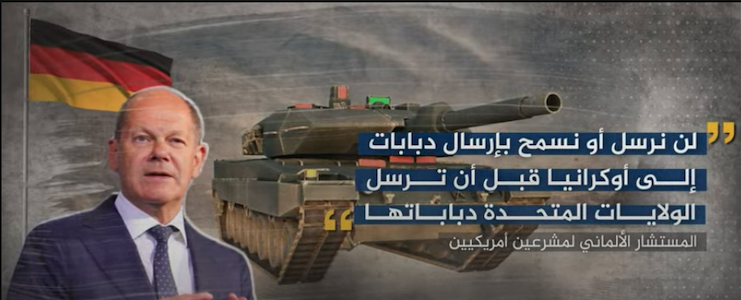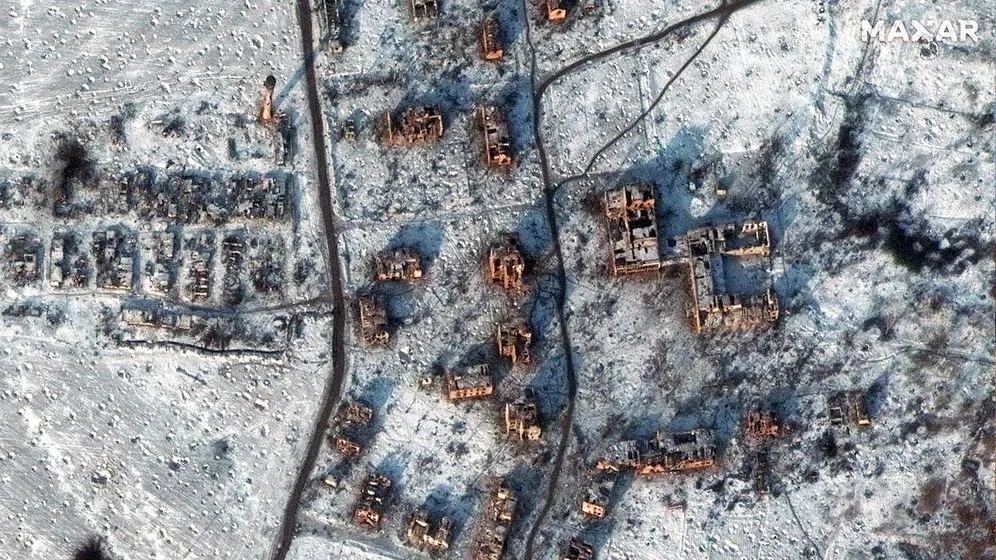New information suggests that divisions within Germany’s ruling elite over the shipment of tanks may not come from any concern over the devastating effects an escalation in the war may cause Germany’s economy but from the battlefield itself. It appears that according to the latest reports, Ukrainian soldiers are dying in staggeringly high numbers, and their deaths are a cause for “alarm” within the highest levels of the German government.
In a report released on Friday coming only a few hours after Pistorius’ announcement from Ramstein on the lack of a “unified position” with respect to the shipment of Leopard 2 tanks to Ukraine, the German daily, Der Spiegel, released a news flash from the Bundesnachrichtendienst, Germany’s Federal Intelligence Service (hereinafter BND), which reports to and is directly subordinate to Chancellor Olaf Scholz, Pistorius’ immediate supervisor.
Entitled in German, “Bundesnachrichtendienst warnt vor hohen Verlusten der ukrainischen Armee” (the BND warms against high losses in the Ukrainian army), the report is an astounding revelation in regards to the battle of Bakhmut, especially within the context of the Ramstein meeting. The report states:
“The BND is alarmed by high casualties in the Ukrainian army during the battle for the strategically important city of Bakhmut in the country’s east. The Foreign Intelligence Service informed members of the Budestag’s Security Council in a secret session this week that the Ukrainian army is currently losing triple digit numbers of soldiers [emphasis added] every day in the battles with Russian invaders.
The report continues:
“The BND warned that the Russians’ siege of Bakhmut would have serious consequences, as it would allow Russia to make further advances inland. The BND also reported that the Russian army is acting with merciless severity. Russia is currently throwing soldiers into the fighting like cannon fodder, and that its own high number of losses apparently have no affect.” [1]
In response to these astounding revelations, Ukrainian sources repeated the news throughout social media platforms. The central theme of the revelation, the triple digit loss of Ukrainian soldiers, has been picked up throughout Ukraine’s various news agencies on the Internet, especially Ukrainian ones.
The headline of one Ukrainian daily reads thus: “Німецька розвідка стурбована тризначними втратами України у боях за Бахмут.” The headline translates as “German intelligences is concerned about the triple digit loss of Ukrainian [soldiers] on the battlefields of Bakhmut.” [2]
Other Ukrainian news agencies simply make the plural singular, “тризначні втрати,” indicating “triple digit loss” of Ukrainian soldiers. [3]
Given the time of their release, these reports by Germany’s foreign intelligence services suggests that Germany’s concern most of all is that the Ukrainian army’s stagger losses on the battlefield suggest its own disintegration, as Russia appears to be the on the verge of sieging the city of Bakhmut.
The delay in the shipment of Leopard 2 tanks is more likely attributable therefore to the failure of Ukrainian armed forces 1) to continue the momentum achieved after capitalizing on Russia’s blunders in the September counteroffensives, and 2) an understanding that the fall of Bakhmut, whose increasingly stark encirclement has already terminated the aforementioned counteroffensives, entails an irrevocable shift in the war.
Steffen Hebestreit, Germany’s spokesman for the government, has already repudiated the widely circulated rumor that Germany’s decision to forgo the shipment of Leopard 2 tanks is based on the US’ refusal to honor a request to ship its own M1 Abrams. Although the rumor is substantiated by Scholz’s own statements, the underlying reasons for Germany’s decision is not a failed quid pro quo.

“The Federal Government has clarified that Germany’s shipment of German manufactured Leopard 2 tanks does not depend upon US shipment of American made M1 Abrams tanks,” the news flash from Der Spiegel reported.
The news flash quotes Hebestreit as saying, “at no time was there ever a link or a requirement that one depended upon the other.
“It’s hard for me to imagine a German Chancellor,” he continued, “dictating conditions or making demands on an American president.” [4]
Despite refusing to ship the Leopard 2 tanks, Germany, nonetheless, announced a 1 billion Euro spring military aid package for Ukraine. In the military aid package, Germany will provide Ukraine with a 1 billion Euro ($1.1 billion) in military assistance.
The BND’s reports on staggering Ukrainian losses were followed up by reports on the fall of another city, Klishchiivka, a settlement south of Bakhmut, on Friday. [5]
Klishchiivka, Soledar, and Bakhmut
On Friday Russian proxy forces in eastern Ukraine had taken control of Klishchiivka, a small settlement south of Bakhmut in eastern Ukraine, almost hours after the conclusion of the Ramstein meeting and Germany’s announcement that the Ukrainian contact group failed to reach a unified position on the shipment of Leopard 2 tanks.
With the capture of Klishchiivka together with the fall of Soledar, Russians are tighten the noose around Bakhmut.
Klishchiivka, Soledar, and Bakhmut, which have been the centre of fighting among Ukrainian armed forces, its foreign legion, the Wagner Group and Russian armed forces for months, all lay in ruins.
In a recently published article by Der Spiegel, satellite images from the cities’ ruins display orange buildings, as if covered in blood, with disemboweled innards standing amidst innumerable craters fanning outward away from the city’s center. It is clear that the missile, artillery, or mortar bombardments of the cities have made life there unlivable.[6]

As opposed to Klishchiivka or Soledar, which are important in their own right, Bakhmut, however, is a city of immense strategic importance with respect to the Dnipro. If it has taken the Russians a duration longer than several months to dislodge Ukrainian armed forces, a similar, if not greater duration may be required to dislodge Russians in a counterattack. The city’s geographic location as pitched on two sides of the Bakhmutka make the city an ideal location for launching an offensive.
The Russians, who have continuously asserted their forward operability to the south of the Dnipro in Kherson (since their withdrawal to the eastern bank of the river), are repeatedly advancing to a position in Bakhmut and Soledar from which Russian armed forces may thereafter compel and channel Ukrainian armed forces to fight on the side of the Dnipro Russians chose for the main thrust of their Spring counteroffensive.
Bakhmut’s location with respect to the Dnipro would therefore deprive, if it were to fall into Russia hands, Ukrainian armed forces of the ability to assert force on one or the other side of the river simultaneously. With Bukhmutka serving as a bulwark on the flank in the North with the Dnipro providing the same for Kherson in the South, the Russians would be capable of securing their continuous forward operability in the Spring against the backdrop of a natural system of defenses in the waterways of Ukraine.
Aerial Bombardment of Moscow
Military strategists and analysts throughout the world and especially the Middle East are acutely aware of the consequences of the fall of Bakmut. In light of the recent Russian advances on the cities of Soledar and Bakhmut and the staggering loss of Ukrainian life among its armed forces, the Israeli press reported a brief analysis of a recent meeting between Zelensky and the head of the Central Intelligence Agency, William Burns, in the daily, Maariv, in which the later revealed Russia’s plans for the next phase of the war.
The analysis takes into account the mood in Washington after the midterm elections, and, as the author explains how “high ranking members in Ukraine’s Ministry of Defense are afraid that the United States may limit the amount of military aid it gives to Ukraine after Republicans gained control of the House of Representatives and recent polls suggest waning support for Ukraine.” [7]
Russians’ awareness of Ukraine’s deepening vulnerability on both northern and southern fronts is clear. In the Arabic daily, Al Arabiya, a recent report details how Russia appears to be preparing to defend the capital from an aerial bombardment.
Entitled, “الدفاع الروسية: نشر أنظمة بطاريات دفاعية في موسكو,” the report notes that for the first time since the start of the Ukraine war, Moscow has deployed S300 anti-aircraft defense batteries in the capital.
“For the first time since the start of the Ukraine war, Russia’s Defense Minister announced today that Russia is beginning to run drills for preparation against an aerial bombardment on important military and administrative buildings in the Moscow region and the drills are to be conducted with Russia’s [remotely controlled and electronic] S-300 anti-aircraft missile system.” [8]
It is likely that as Germany refuses to supply Ukraine with its Leopard 2 tanks, therein arises the specter that NATO allies such as Poland (to whom Antony Blinken gave “the green light” for allowing its fighter jets to be flown by pilots from the Ukrainian Air Force), Estonia, Latvia, or Lithuania may plan an aerial bombardment. Such an aerial bombardment would likely target not only the front lines of Donetsk but Moscow itself.
Moscow’s decision to conduct drills in Moscow with its S-300 anti-aircraft missile system reflect awareness of the dwindling military options for the Ukrainian armed forces.
The possibility of an aerial bombardment on Russia’s front lines and in Russia itself increases, as the high number of casualties and Russia’s own gains, make the situation for Zelensky and his cabinet all the more dire, especially after the loss of several high ranking members of cabinet in an unexplained helicopter crash.
Seen in light of these factors, President Biden’s remarks regarding the deployment of American fighter jets to Ukraine make the thought of an aerial bombardment of Russian armed forces and Russia proper far less startling now than perhaps any time previously during the war.
The Disintegration of the Ukrainian Armed Forces
The battle for Bakhmut has been stretching the Ukrainian armed forces thin for quite a while now. As early as December but before the fall of Soledar, soldiers in the Ukrainian military have complained about Russia’s continuous advances.
In the words of a Ukrainian soldier from December, Kostyantyn, an exhausted Ukrainian machine gunner, the attacks are unrelenting. “It’s like a conveyor belt,” he said of the Russian tactics. “For what? A fucking metre of our land.” [9]
Speaking from within the city of Bakhmut recently, another Ukrainian soldier’s desperate pleas for heavy weaponry from the West reflect yet again the Ukrainian military’s own internal weakness. “If you can’t stop Russia now, your army will have to stop Russia.” [10] By “your army,” he means a NATO army.
Without massive funding in the form of economic, humanitarian or military aid, Ukrainian armed forces are incapable of waging war with Russia for even so much as a “metre” of land.
Burgeoning on collapse, Ukrainian armed forces are entirely reliant upon Washington and its NATO allies to keep face, especially since Ukraine’s economy is in a precipitous free fall and its public services, such water, electricity or gas, are crippled.
Ukraine’s armed forces, Ukraine, and Zelensky and his cabinet hang from a single thread from NATO, the UK and the US. As their reliance deepens, the threat of the war’s expansion grows.
It is clear that if Ukrainian armed forces disintegrate, the disintegration is bound to trigger the entrance of a NATO ally, the United States or both into direct conflict with Russia, transforming the war from a war in one country to a transatlantic, cross-continental and global conflict with enormously deadly proportions. It raises the spectra of superpowers at war on European soil with the looming threat of a nuclear catastrophe.
References
[1] – [“Bundesnachrichtendienst warnt vor hohen Verlusten der ukrainischen Armee” ; Der Spiegel, January 20th, 2023]
[2] – [“Німецька розвідка стурбована тризначними втратами України у боях за Бахмут – Spiegel”; eurointegration.com.ua, January 20th, 2023]
[3] – [“Німецька розвідка відреагувала на «тризначні втрати» України у боях за Бахмут – Spiegel” ; ukr.net, January 20th, 2023]
[4] – [“Bundesregierung: Leopard-Lieferung hängt nicht von US-Abrams ab” ; Der Spiegel, January 22nd, 2023]
[5] – [“Russisches Militär meldet Einnahme von Ort bei Bachmut” ; Der Spiegel, January 20th, 2023.]
[6] – [“Satellitenbilder zeigen die Ruinen von Soledar und Bachmut”, Der Spiegel, January 17th, 2023]
[7] – [“בהלה במוסקבה”: מערכת נ”מ הועברה “בדחיפות” למעונו של פוטין בבירה”; maariv.co.il, January 20th, 2023]
[8] – [“لأول مرة منذ بداية الحرب الأوكرانية، أعلنت وزارة الدفاع الروسية، اليوم السبت، إجراء تدريبات على صد هجمات جوية على منشآت عسكرية وإدارية مهمة في منطقة موسكو بمشاركة بطارية من أنظمة الصواريخ المضادة للطائرات من طراز إس-300.,” ~ “الدفاع الروسية: نشر أنظمة بطاريات دفاعية في موسكو” ; Al Arabaya, January 20th, 2023]
[9] – [“‘Hell. Just hell’: Ukraine and Russia’s war of attrition over Bakhmut” ; Financial Times, December 8th, 2022]
[10] – [“Ukraine War: Soldiers in Bakhmut brace for a full Russian assault”; Sky News, January 20th, 2023]
